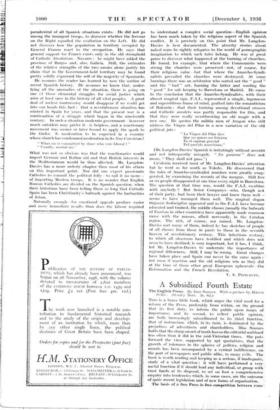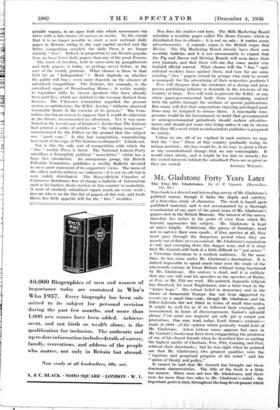A Subsidized Fourth Estate
The English Press. By Jane Soames. With a preface by Hilaire Belloe. (Stanley Nott. 3s. -6d.) • Tills is a brave little book, whickurgeS the vital need for a - reform of the Press, preferably from within, on the ground that its first duty, to inform the public upon issues of importance, and its second, to reflect public opinion, are both increasingly subordinated to its _third function, that of instruction, Ifhich,irrits turn, is doti- tinated by the prejudices of advertisers and shareholders. Miss Soames holds that the sharp sword of truth leaves the editorial scabbard less often than it did- in-the mid-Victorian times. She puts forward the view, supported by apt quotations, that the: growth of tolerance in the spheres of politics, religion and Morals has been accompanied by a cynical indifference, on the part of newspapers and public' alike, to many evils. The book is worth reading and keeping as a serious, if inadequate, study of a vital question : it will have performed a very: useful function if it should lead any individual, 'or group with: trust funds, at its disposal, to set on foot a comprehensive enquiry into tendencies which, in some cases, are the outcome: of quite recent legislation and of new forms of _organisation. .. -The bitsis of a free- Press-is-free-eemOetition betweencorn-% parable organs, in an open field into which newcomers can enter with a fair chance of success on merits. To the extent that it is no longer possible to start a new national daily paper in Britain, owing to the vast capital needed and the bitter competition entailed, the daily Press is no longer entirely " free." Indeed, in proportion to our literate popula- tion, we have fewer daily papers than any of the great Powers.
The torch of freedom, held in succession by pamphleteers and daily papers, is today, as perhaps never before, in the care of the weekly journals. What chance is there in that field for an " Independent " ? Much deptnds on whether the public will buy ; even more depends on the absence of subsidised competition. The Listener, for example, is the subsidised organ of Broadcasting House : it exists mainly to reproduce talks by chosen speakers who have already been paid fees, which are debited to the revenue derived from licences. The Ullswater Committee regarded the present system as satisfactory, the B.B.C. having " hitherto observed reasonable limits in the exercise of its powers." The Com- Mittee, having no reason to suppose that it would do otherwise in the future, recommended no alteration. Yet it was men- tioned in the recent case of Lambert v. Levitt! that The Listener had printed a series of articles on " the talking mongoose," commissioned by the Editor on the ground that the subject was " good copy." Is this fair competition, remembering how most of the copy of The Liitener is obtained ? I think not.
Nor is this the only sort of competition with which the " free" weekly Press is faced. The National Labour Party subsidises a fortnightly political " news-letter " which has a large free circulation. An anonymous group, the British Palestine Committee, publishes a weekly Bulletin devoted to an ex park statement of its supporters' views. The name of the editor and his address are unknown : it is not on sale but is very widely distributed. The Russo-British Chamber of Commerce distributes free of charge a bulletin of information such as its backers desire readers in this country to assimilate. A score of similarly subsidised organs reach me every week ; anyone who is on the free list of papers of this sort, and reads them, has little appetite left for the " free " weeklies. Nor does the -Matter end. here. The Milk Marketing Board subsidise a monthly paper called The Home Farmer, which is distributed free to clients : it is not on sale : it carries many advertisements. A cognate organ is the British Sugar Beet Review. The Pig Marketing Board already have their own monthly bulletin, and it is not unreasonable to expect that the Pig and Bacon and Herring Boards will soon have their own journals, and that these will one day come under cen- tralised official control. What chance will the " free " agri- cultural weeklies have against them, and how far are some existing " free " papers owned by groups who wish to secure a monopoly for the advertising of their respective products ?
Few will disagree that the existence of a strong and pros- perous publishing industry is desirable in the interests of the country at large. Few will wish to prevent the B.B.C. or any- other quasi-governmental body from maintaining contact with the public through the medium of special publications. But many will feel that corporations enjoying privileged posi- tions may be tempted to misuse them. A reasonable com- promise would be for Government to insist that governmental or semi-governmental periodicals should eschew advertise- ments and should not come into being unless it can be shown that they fill a need which no independent publisher is prepared to satisfy.
Unless we are, all of us, vigilant in such matters we may find the " free" Press of this country gradually losing its unique position ; the loss would be, in its way, as great a blow as any constitutional change that we can contemplate. It would come slowly, and it might be too late to remedy, for the vested interests behind the subsidised Press are as great as





















































 Previous page
Previous page